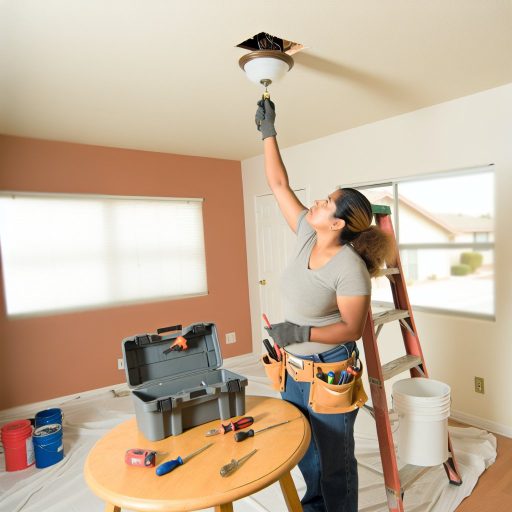Understanding the Importance of Property Inspections for Vacation Homes
Protecting Your Investment
Investing in a vacation home requires careful consideration.
A comprehensive property inspection safeguards your investment.
It helps identify hidden issues before they escalate.
Consequently, you avoid costly repairs in the future.
Ensuring Safety for Guests
Your vacation home should provide a safe environment for guests.
Regular inspections ensure that all safety standards are met.
This includes checking smoke detectors and carbon monoxide alarms.
Moreover, inspections can highlight any structural issues.
Maintaining Property Value
A well-maintained property retains its market value.
Regular inspections can guide necessary maintenance tasks.
Intending to sell your vacation home?
Potential buyers appreciate properties with a solid upkeep record.
Compliance with Local Regulations
Vacation homes often face strict local regulations.
Inspections help ensure compliance with zoning laws and building codes.
Staying compliant can prevent potential fines and legal issues.
Transform Your Real Estate Decisions
Unlock personalized real estate insights crafted just for you. Get actionable advice designed to amplify your success.
Get StartedThus, timely inspections keep you informed of necessary updates.
Peace of Mind
Knowing your property is in good condition brings peace of mind.
Regular inspections allow you to enjoy your vacation home stress-free.
You can focus on creating memories with family and friends.
Ultimately, proactive property management enhances your experience.
Common Issues Found During Inspections of Vacation Properties
Structural Problems
Structural integrity is vital for vacation homes.
Inspectors commonly find cracks in walls and ceilings.
Additionally, rotting beams may be hidden under siding.
Check for sagging roofs and uneven floors.
These issues can lead to expensive repairs later.
Roofing Concerns
The roof is a critical component of any property.
Wear and tear can lead to leaks and water damage.
Inspectors often note missing shingles or tiles.
Improper drainage systems can exacerbate these issues.
Showcase Your Real Estate Business
Publish your company profile on our blog for just $200. Gain instant exposure and connect with a dedicated audience of real estate professionals and enthusiasts.
Publish Your ProfileRegular maintenance can prevent many roofing problems.
Electrical System Deficiencies
Electrical issues pose significant safety hazards.
Inspectors frequently find outdated wiring systems.
Improperly insulated wires may increase the risk of fire.
Look for exposed electrical components during inspections.
Updating systems ensures safety for guests and owners.
Plumbing Problems
Plumbing systems often show signs of neglect.
Inspectors see leaks in pipes and fixtures frequently.
Check for water stains on walls and ceilings.
Clogged drains may signal deeper plumbing issues.
Proper maintenance can prolong the lifespan of plumbing systems.
Pest Infestations
Pests can cause significant damage to vacation homes.
Termites are a common concern for wooden structures.
Inspectors look for signs of rodent infestations too.
Regular pest inspections can mitigate these risks.
Early detection is key to reducing damages.
HVAC System Issues
An efficient HVAC system is essential for comfort.
Inspectors often find neglected filters and ductwork.
Look for signs of poor airflow and unusual noises.
Regular maintenance ensures optimal performance.
This keeps guests comfortable year-round.
Environmental Hazards
Vacation properties may contain environmental risks.
Mold and mildew can develop in humid areas.
Inspectors check for signs of dampness and odors.
Asbestos and lead paint are concerns in older homes.
Addressing these hazards protects tenant safety.
How to Choose the Right Inspector for Your Vacation Home
Identify Your Needs
Your vacation home may have different inspection requirements than your primary residence.
Consider what specific issues you hope to address during the inspection.
For instance, you might want a focus on mold or water damage.
Additionally, evaluate the unique features of your home.
Showcase Your Real Estate Business
Publish your company profile on our blog for just $200. Gain instant exposure and connect with a dedicated audience of real estate professionals and enthusiasts.
Publish Your ProfileThis includes any special construction or outdoor elements.
Research Inspector Qualifications
Start by researching the qualifications of potential inspectors.
Look for licensed professionals with relevant certifications.
For example, the National Association of Home Inspectors provides a comprehensive directory.
Moreover, check if they have specialized training for vacation homes.
Check Experience and References
Experience plays a crucial role in an inspector’s reliability.
Ask about their background with vacation home inspections specifically.
Request references from past clients to gauge their performance.
Contact these references and inquire about their experiences.
Review Sample Reports
Reviewing a sample inspection report can provide valuable insights.
This showcases their attention to detail and thoroughness.
Ensure that the report format is clear and organized.
A good inspector will offer a comprehensive yet easy-to-understand report.
Compare Costs
Cost is an important factor in selecting an inspector.
Request quotes from multiple inspectors to compare pricing.
However, remember that the lowest price may not always indicate the best service.
Weigh the costs against their qualifications and experience.
Schedule a Consultation
Once you’ve narrowed down your options, schedule a consultation.
This allows you to ask questions and express your concerns.
Moreover, it gives insight into their communication style and professionalism.
Evaluate how comfortable you feel discussing your vacation home with them.
Confirm Insurance and Guarantees
Finally, ensure the inspector carries professional liability insurance.
This protects you against potential mistakes during the inspection.
Additionally, inquire about any satisfaction guarantees they offer.
Trustworthiness is key when choosing the right inspector.
See Related Content: State-Specific Landlord Tenant Laws and Regulations
Checklist for Conducting a Thorough Vacation Home Inspection
Preparation Steps
Begin by gathering necessary tools for the inspection.
A flashlight, ladder, and notepad are essential.
Next, review any previous inspection reports.
This will provide insights into potential issues.
Showcase Your Real Estate Business
Publish your company profile on our blog for just $200. Gain instant exposure and connect with a dedicated audience of real estate professionals and enthusiasts.
Publish Your ProfileFinally, create a detailed inspection checklist.
Exterior Inspection
Start by checking the roof for damage.
Look for missing shingles or leaks.
Inspect the gutters for blockages.
This can prevent water damage to the home.
Next, examine the walls for cracks or peeling paint.
Check windows and doors for proper sealing.
Afterward, assess the foundation for cracks or settling.
Interior Inspection
Begin with the plumbing system.
Check for leaks under sinks and around toilets.
Look for signs of mold or water damage.
Next, inspect the electrical system.
Test all outlets and switches for functionality.
Examine the heating and cooling systems closely.
Ensure they are functioning properly.
Safety Features
Check for smoke and carbon monoxide detectors.
Ensure they are installed and functioning.
Inspect fire extinguishers for accessibility and condition.
Additionally, assess the presence of first aid kits.
Make sure they contain necessary supplies.
Final Considerations
Review the property’s overall cleanliness and maintenance.
Note any landscaping issues that need addressing.
Finally, compile your findings into a report.
This will help owners understand necessary repairs.
For each issue, suggest possible solutions.
Learn More: How to Write Persuasive Ad Copy for Rental Property Listings Online
Evaluating the Costs Associated with Property Inspections
Understanding the Importance of Property Inspections
Property inspections are essential when purchasing vacation homes.
They help identify potential issues before making a significant investment.
Moreover, inspections can save homeowners from costly repairs later.
Understanding the inspection process is crucial for budgeting effectively.
Showcase Your Real Estate Business
Publish your company profile on our blog for just $200. Gain instant exposure and connect with a dedicated audience of real estate professionals and enthusiasts.
Publish Your ProfileFactors Influencing Inspection Costs
Several factors affect the total cost of property inspections.
First, the size of the property plays a significant role.
Generally, larger homes require more time to inspect, increasing costs.
Location also affects pricing, as services vary by region.
Additionally, the age and condition of the property can influence fees.
Furthermore, specialized inspections may be necessary, raising overall expenses.
Breaking Down Typical Costs
Most standard property inspections fall within a specific price range.
Homebuyers can expect to pay between $300 and $500 on average.
This cost typically covers a thorough evaluation of the property.
However, additional inspections for pests or HVAC systems may incur more fees.
Homeowners should consider setting aside extra funds for these services.
Assessing Long-term Benefits
Investing in property inspections offers long-term financial benefits.
For instance, identifying issues early can prevent severe damage later.
This proactive approach helps maintain the property’s value over time.
Additionally, inspection reports can inform future repairs and upgrades.
Ultimately, this investment pays off by ensuring a safe and sound vacation home.
You Might Also Like: How to Find Reliable Contractors for Property Maintenance

The Role of Homeowners Associations in Vacation Home Inspections
Promoting Property Value
Homeowners associations play an essential role in maintaining property values.
They set standards for property appearance and upkeep in the community.
Consequently, they help ensure homes remain attractive to potential renters or buyers.
Regular inspections can deter neglect and undesirable conditions.
Establishing Guidelines
Homeowners associations establish clear guidelines for vacation home inspections.
These guidelines often dictate maintenance requirements and inspection frequency.
Moreover, they help homeowners understand their responsibilities clearly.
By outlining these expectations, associations can promote accountability among owners.
Conducting Inspections
Associations may conduct routine inspections of vacation homes.
These inspections assess compliance with community standards.
They also identify potential issues that owners may overlook.
Regular assessments keep properties in good repair and enhance neighborhood appeal.
Facilitating Communication
Homeowners associations facilitate communication between owners and management teams.
Showcase Your Real Estate Business
Publish your company profile on our blog for just $200. Gain instant exposure and connect with a dedicated audience of real estate professionals and enthusiasts.
Publish Your ProfileThis communication can help address maintenance concerns quickly.
Furthermore, it allows for the sharing of inspection results and recommendations.
Thus, it fosters a collaborative environment among property owners.
Enforcing Compliance
Homeowners associations are responsible for enforcing compliance with regulations.
If a property fails to meet standards, the association addresses it promptly.
This enforcement often includes issuing fines or corrective action notices.
As a result, it helps maintain the overall quality of the community.
Enhancing Community Experience
Good property maintenance contributes to a positive community experience.
Homeowners associations strive to create appealing environments for residents and visitors.
Regular inspections ensure that communal spaces also meet established standards.
This attention to detail enhances the attractiveness of vacation homes.
Find Out More: Property Inspections for Seller Disclosures
Preparing Your Vacation Home for an Inspection
Understanding the Importance of Inspections
Inspections are essential for maintaining any property.
They help identify potential issues before they escalate.
Furthermore, inspections can enhance your vacation home’s value.
Scheduling the Inspection
Start by contacting a qualified inspector.
Beforehand, research local inspectors for credibility.
Then, schedule the inspection at a convenient time.
Consider opting for an off-peak season to avoid rush.
Preparing the Interior
Begin by decluttering all rooms in your vacation home.
This allows the inspector to assess every area easily.
Next, ensure that all utilities are operational.
For example, check water, electricity, and heating systems.
Additionally, clean floors and windows for better visibility.
Organizing the Exterior
Evaluate the home’s exterior before the inspection.
Remove unnecessary items from the yard and deck areas.
Inspect the roof and gutters for debris or damage.
Make sure all exterior lights are functional.
Pay attention to the landscaping; trim bushes and mow lawns.
Documenting Maintenance Records
Compile all recent maintenance and repair records.
Showcase Your Real Estate Business
Publish your company profile on our blog for just $200. Gain instant exposure and connect with a dedicated audience of real estate professionals and enthusiasts.
Publish Your ProfileThis documentation helps establish a property’s care history.
In addition, gather receipts for major purchases or improvements.
For example, include roof repairs or HVAC system upgrades.
Communicating with the Inspector
Before the inspection, introduce yourself to the inspector.
Provide them with a list of concerns you may have.
This exchange ensures the inspector addresses your main issues.
Always be open to their observations during the process.
Final Preparations
On the inspection day, ensure the property is accessible.
Remove pets from the premises to avoid distractions.
Finally, be available to answer any questions that arise.
Legal Implications of Property Inspections in Vacation Home Transactions
Understanding Legal Obligations
Property inspections are crucial in vacation home transactions.
Buyers and sellers must understand their legal obligations.
It ensures both parties are aware of the property’s condition.
Legally, sellers must disclose any known issues.
Failure to disclose may lead to liability for breach of contract.
Importance of Contracts
Contracts serve as a framework for the inspection process.
They outline the terms and conditions for inspections.
These agreements protect both the buyer and the seller.
Buyers should conduct inspections before finalizing any purchase.
This strategy helps identify potential issues in advance.
Potential Risks and Liabilities
Ignoring property inspections can result in unforeseen issues.
Buyers may face expensive repairs after the purchase.
Additionally, sellers could incur legal repercussions.
It is vital to document all inspection results clearly.
This documentation helps protect against future disputes.
Role of Licensed Inspectors
Engaging licensed inspectors adds credibility to inspections.
Their expertise helps uncover hidden defects.
Licensed inspectors can evaluate safety and compliance issues.
In many regions, their reports are often required by law.
Professionals provide protection against liability for both parties.
Showcase Your Real Estate Business
Publish your company profile on our blog for just $200. Gain instant exposure and connect with a dedicated audience of real estate professionals and enthusiasts.
Publish Your ProfileState-Specific Regulations
Laws governing property inspections vary by state.
Some states require specific disclosures in vacation home sales.
Understanding local regulations is crucial for compliance.
It can impact liability and the overall transaction process.
Buyers are advised to research state inspection requirements.
Additional Resources
My landlord is coming to do an inspection tomorrow. Do we have to …




